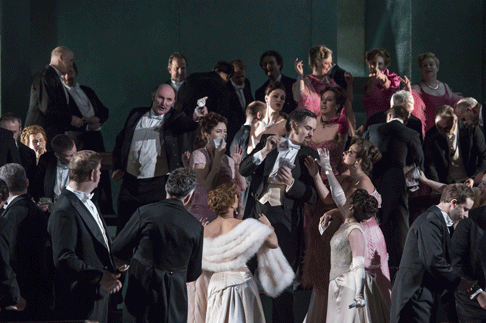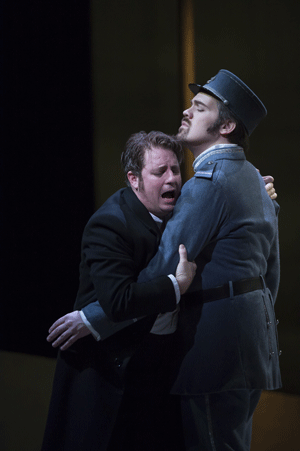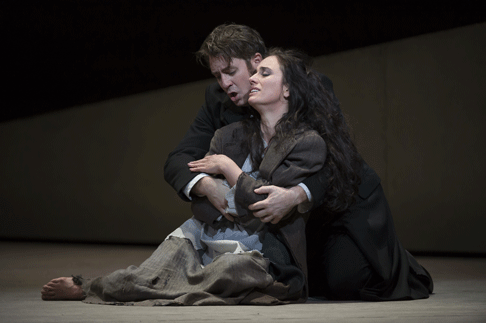22 Jan 2014
Jules Massenet: Manon, ROH
Tart with a heart, pleasure-loving ingénue, exploited naïf, or femme fatale?

Tart with a heart, pleasure-loving ingénue, exploited naïf, or femme fatale?
Like Carmen before her, Manon leads men to steal, cheat and murder; but in Massenet’s opéra comique, the sweet sensuous of the score, and in particular the affecting beauty of the ‘innocent’ heroine’s music, might convince us that the worst thing she is ‘guilty’ of is a slight flightiness.
Laurent Pelly’s 2010 production, receiving its first revival here (revival director, Christian Räth), was designed with a particular Manon in mind - star diva Anna Netrebko, whose performances were lauded for their passionate fervour and luscious tone, and for the sparkling ‘chemistry’ between Netrebko’s Manon and her Des Grieux, Vittorio Grigolo. Ermonela Jaho, who made such a stirring debut at Covent Garden in 2008, as Violetta (again, stepping into Netrebko’s shoes, when the latter was indisposed), took a little time to warm up; in the opening act, her characterisation seemed to me rather unsubstantial, as she flitted about the central, open expanse of Chantal Thomas’s Amiens square, swirling and dancing light-heartedly. She certainly did not look as if she was unduly threatened or cowered by the looming walls of the convent to which her family have sent her - because she is too fond of a good time.
Jaho’s tone is attractive but, initially at least, was not sufficiently full of bloom to communicate engagingly with the audience, and the lower range lacked weight and focus; moreover, an overly broad vibrato and some rather indistinct French led to a sense of nebulousness. She brought greater variety of colour and more commitment to subsequent acts; ‘Adieu, notre petite table’ was a touching farewell to the humble, honest home life she has shared with Des Grieux; and Jaho sparkled disarmingly in Act 3, the high roulades of ‘Je marche sur tous les chemins’ and ‘Obéissons quand leur voix appelle’ secure and conveying her frivolous delight and youthful superficiality.

American tenor Matthew Polenzani was a physically striking and vocally compelling Chevalier des Grieux. His powerful lyric tenor was soulful and touching; the ravishing whispered high pianissimos of his Act 2 aria, ‘En fermant les yeux’, suggested the fragility of his dreams for their future happiness. ‘Ah! Fuyez, douce image’, as the Abbé relives his memories with Manon, expressed both integrity and vulnerability; it was the highlight of the night. Polenzani has an exemplary grasp of the French idiom; the smooth legato, the sinuousness phrasing, and the sheer beauty of sound combined to create a dramatically convincing and musically enthralling performance. He deserved his considerable approbation.
Audun Iversen’s Lescaut was fittingly rumbustious, swaggering arrogantly and singing with vigour and vitality. As Guillot de Morfontaine, French tenor Christophe Mortagne was superb, reprising the role in which he made his ROH debut in 2010: by turns deluded roué and bitter fool, his strong acting was complemented by characterful singing. Alastair Miles and William Shimell offered strong support as the aging Count des Grieux and the self-important De Brétigny respectively.
 Matthew Polenzani as Chevalier Des Grieux and Audun Iversen as Lescaut
Matthew Polenzani as Chevalier Des Grieux and Audun Iversen as Lescaut
Simona Mihai recreated her 2010 role as Pousette and was joined by two Jette Parker Young Artists, Rachel Kelly (Javotte) and Nadezhda Karyazina (Rosette). The perky trio sang crisply and brightly, their stage movements neatly executed and well-timed.
Pelly’s production is all about shifting perspectives and angles. Although the action has consciously been shifted from the France of Louis XV to La Belle Époque, in fact it tends towards abstraction, specificity of costume and period being less important than the inferences of the design. In Act 1 a steep staircase rises precipitously to the town houses perched precariously atop the convent walls (the stonework has all the solidity and appeal of a self-assembly furniture kit from MUJI); the stairway swings through 180⁰ for Act 2, forming a rickety gang-plank to the lovers’ garret apartment. The purple-grey Paris skyline shimmers charmingly in the hinterland, but the zig-zagging incline of the staircase embodies the obstacles in their path to future happiness.
Two crooked raked passageways, bordered by ugly metal railings, straddle the breadth of La Cours-la-Reine; the restriction on free movement that this imposes makes for a few choreographic challenges - the scene is really just an excuse for the opéra-comique’s obligatory ballet divertissement - but these are surmounted through some complex manoeuvring of personnel. There are some visual mishaps though. What is the point of the hazy ferris wheel flickering in the distance? And, what is the large round orange object centre-backdrop? Similarly, in scene 2 the dull green monochrome of the gaming room of the Hôtel de Transylvanie evokes severe asceticism rather than rakish hedonism.
In Act 4, the pillars in the vestry of the seminary at Saint-Sulpice list alarming askew, mirrored by Des Grieux’s austere iron-framed bed in the smaller chamber seen to the left; indicative of the way Abbé des Grieux’s faith is about to lurch out of kilter. Having behaved shockingly and with impunity throughout the opera, insouciantly offending bourgeois sensibilities and mores, in the final act Manon’s sins come home to roost and our heroine expires on road to Le Havre; Thomas’s angles have now sharpened to an infinity point, a row of street lights leading the eye to the horizon, the bleakness of the landscape (effectively lit by Joël Adam) inferring the desolate future.
 Matthew Polenzani as Chevalier Des Grieux and Ermonela Jaho as Manon Lescaut
Matthew Polenzani as Chevalier Des Grieux and Ermonela Jaho as Manon Lescaut
The chorus were on good form. The choreography (Lionel Hoche) is at times quite complex, requiring precision and nimbleness, and the large crowd scenes were slick. In the Hôtel de Transylvanie the bareness of the set, while unappealing to the eye, did at least allow for some complicated drills. Dressed in a shocking pink, sleeveless gown (a jarring clash with the deadening green walls), Manon presents a show routine reminiscent of Madonna’s video for Material Girl (itself a wry take-off of Marilyn Monroe’s Diamonds Are A Girl’s Best Friend) -an allusion which was presumably intended to highlight the topicality of a tale which tells of a young woman’s desire for wealth and material comfort at the expense of love and relationships.
It’s a long show, at four hours, and at times I felt that conductor Emmanuel Villaume might have moved things along more swiftly. But the ROH Orchestra played with conviction and idiomatic style, the searing act climaxes giving depth and credibility to the emotions depicted on stage.
Overall, Pelly and Thomas tell the story clearly but they don’t quite fully engage our sympathy for the protagonists; the production needs a bit of a pick-me-up - perhaps things will swing along with more passion and pace as the run proceeds.
Claire Seymour
Cast and production information:
Manon Lescaut, Ermonela Jaho; Lescaut, Audun Iversen; Chevalier des Grieux, Matthew Polenzani; Le Comte des Grieux, Alastair Miles; Guillot de Morfontaine, Christophe Mortagne; De Brétigny, William Shimell; Poussette, Simona Mihai; Javotte, Rachel Kelly; Rosette, Nadezhda Karyazina; Innkeeper, Lynton Black; Guard 1, Elliot Goldie; Guard 2, Donaldson Bell; Director, Laurent Pelly. Conductor, Emmanuel Villaume; Dramaturg, Agathe Mélinand; Set designs, Chantal Thomas; Costume designs, Laurent Pelly and Jean-Jacques Delmotte; Lighting design, Joël Adam; Choreography, Lionel Hoche; Royal Opera Chorus; Orchestra of the Royal Opera House. Royal Opera House, Covent Garden, Tuesday 14th January, 2014.
This is a co-production with The Metropolitan Opera, New York, La Scala, Milan, and Théâtre du Capitole, Toulouse. The run continues until 4 February. Mexican soprano Ailyn Pérez will sing Manon on 31 January and 4 February.